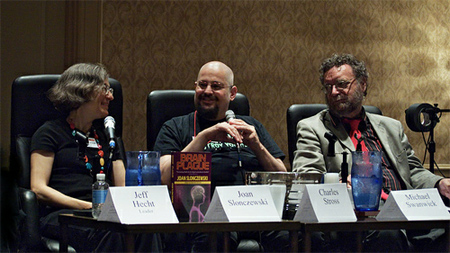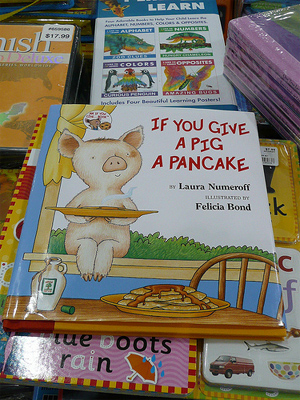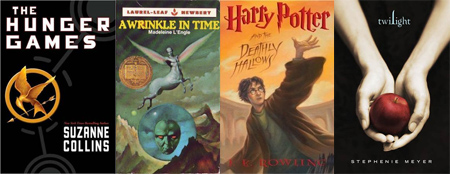Every July, science fiction and fantasy readers, writers, editors, and reviewers gather in Burlington, Massachusetts (outside Boston) for Readercon, a literary science fiction convention. Readercon is special because it is devoted to speculative fiction in novels, short stories, and other writing–setting aside games, movies, TV shows, and the like. It’s a great place to go to talk about everything from bug-eyed monsters to feminism, science fictional politics to Sherlock Holmes–not to mention to bump elbows with and listen to discussions between noted authors and poets. (See the full program here.)
Guests this year include Peter Straub, Caitlin Kiernan, Ellen Datlow, Michael Swanwick, Barry Longyear, Nick Mamatas, Neil Clarke, and others–myself included. (See the full guest list here.)
This year Readercon starts on Thursday, July 12th with free programming and continues for members Friday through Sunday. Memberships are $70 at the door, less for single days.

A panel at a recent Readercon. Photo by Ed Gaillard
My own participation includes discussions on motivation and creativity (including my 1-hour Writing Motivation Toolbox presentation Saturday evening), a panel on transcending the human body, and readings from my book of flash fiction, Bam! 172 Hellaciously Quick Stories.
This will be my second trip to Readercon, and if it’s anything like my first, I plan to have a spectacular time. Hope to see you there.
Luc Reid’s Readercon Schedule
Friday July 13
5:00 PM G Why I Stopped Writing. Erik Amundsen, Nathan Ballingrud, Steve Berman (leader), Geary Gravel, Jennifer Pelland, Luc Reid. We’ve all seen writers logging their word counts, charting their progress toward the next novel or short story. And we’ve heard the advice to keep writing and submitting. But is it ever a good idea to just stop? What can we gain from getting off the publishing merry-go-round, at least for a while? Is stopping a sign of failure, or just another stage in a writer’s career? The panelists discuss how and why they stopped writing (and maybe started up again).
Saturday July 14
6:00 PM RI Writing Motivation Toolbox. Luc Reid. Leveraging recent psychological and neurological research, Luc Reid offers a brief tour of human motivation mechanisms as well as specific ways to get past writer’s block, inspire enthusiasm, sharpen focus, and get words onto the page. Many of the ideas from this talk about writing can be carried over to other areas of life, such as health, business, organization, and relationships.
7:00 PM ME Kurzweil and Chopra, Ghosts in the Same Shell. Athena Andreadis (leader), John Edward Lawson, Anil Menon, Luc Reid, Alison Sinclair.Transhumanism (TH) has been a prominent strain in contemporary SF; cyberpunk is in many ways the fiction arm of the movement. Athena Andreadis and discussants will explore core concepts of TH (longevity, uploading, reproductive alternatives, optimization projects from genome to organism), investigate which are strictly in science fiction versus science territory, and examine the larger outcomes of these tropes within the genre as well as in First Life, aka the real world.
Sunday July 15
10:00 AM ME The Seven Deadly Myths of Creativity. Andy Duncan, Joe Haldeman, Steve Kelner (leader), Toni L.P. Kelner, Matthew Kressel, Jennifer Pelland, Luc Reid. What is creativity, really? How does it work? Many people think of it as somehow magical, but in fact there has been considerable neuropsychological research devoted to the process of creativity, and current evidence makes it clear that it is inherent in the human brain: everyone is creative; the question is how to harness it. There are many myths about creativity that not only are unhelpful but have actively blocked or inhibited writers. Fortunately, many of these myths are entirely explicable and avoidable. Stephen Kelner, a research psychologist who is also a professional writer, will give an overview of the myths and the realities, and discussion will further explore individual participants’ questions or challenges.
11:30 AM NH Reading. Luc Reid. Luc Reid reads ridiculously varied flash fiction from his collection Bam! 172 Hellaciously Quick Stories. Topics include a virulent outbreak of happiness, alien cheesecake focus groups, and Cinderella’s divorce.



 Sandra Tayler, a friend from
Sandra Tayler, a friend from 


